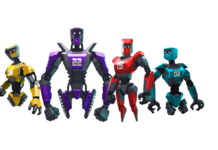Icaros has become one of the more well-known names in virtual reality fitness. Since its founding one year ago, the Germany-based startup company and its fitness machine has been covered on a variety of sites, called the “most fun thing at SxSW,” and even featured on Mashable Tech’s Vine. Icaros’ mission statement is to “work on making you fly every day,” and watching their product in motion, they seem to be succeeding. Co-founder Johannes Scholl (who is the man in the white shirt in that Vine video) was kind enough to talk with us here at VR Fitness Insider. We were able to learn more about where the company came from, where it is now, and where it’s going.
How Did Icaros Start?
Co-founders Michael Schmidt and Johannes Scholl were two industrial designers. Their portfolio included working with a number of big clients, but one of their biggest hobbies was sports and fitness. Icaros really began when the two of them decided to combine that hobby with their technical know-how.
“When we started off with Icaros, it was a project we worked on in our spare time,” says Scholl. “The design concept was something I used for my master’s thesis in industrial design.”

When asked about the inspiration for the fitness machine, Scholl said that he and Schmidt wanted to create a product that motivated people to be more active.
“And what better driver than letting people fly?” Scholl asks. “And at the same time, working out their bodies. We wanted to build a fitness machine that motivated people. Where they are not pumping iron, or going out to run in some cold forest.”
Their website reports that the entirely wireless machine engages a number of core muscles, most notably in the abdominal and shoulder muscles. It also trains balance, reflexes, and concentration.
What Separates VR Fitness from Regular Fitness?
“There are reward mechanisms in place,” Scholl said. “I think that that gamification is important. It’s just another kind of motivation.”
Scholl compared this to how we already usually behave at the gym. When we see someone else lifting weights, we see how heavy they’re going, and we compare that to our own progress. The Icaros team wants to make this sort of competition more apparent in the future.
“With the machine, there is definitely more stuff to come. We’re looking for the opportunity to have multiplayer sessions going on. The idea is to compete virtually on a WiFi-based local connection with two or three machines in the same room. Maybe even globally. From there you can compete against each other and at the same time challenge yourself.”

Scholl remarked on how VR can take you wherever VR can take you. One of his favorite things about showcasing the machine at trade shows like FIBO and ISPO was being able to tell what mode a user was experiencing based on their movements alone.
“When they’re just flying around, they’re really taking their time. They’re looking at the landscape. Then there is another mode where you’re sort of facing off against enemy drones. When you watch them playing that, it looks like what you’d expect if they were in a dogfight.”
We’ve talked a lot about immersion here on VR Fitness Insider, and it’s no big secret why.
“It’s the same with music,” Scholl said. “You feel different when you’re listening to Beethoven than when you’re listening to Rammstein, or 50 Cent. It influences the way you move.”

Where is VR Fitness Headed?
Icaros is just one of the many companies that have given virtual reality the fitness treatment, but Scholl reflected on them not as competitors, but something akin to collaborators.
“There’s really so many different ways it could go, and what you can achieve with it,” he said. “You can use VR to simulate stuff you can do in reality, of course, and you can create completely new experiences you can’t do in reality. There are so many things you can do. It’s limitless.”
In terms of fitness, Scholl praised VR’s ability to improve something that we have already been doing for years.
“Perhaps it’s not so much about the experience, but instead enriching normal workouts.”
What About the Downsides?
To the naysayers who think that VR is just a fad, trend, or gimmick that will fade in time, Scholl had the following to say.
“The most important thing is to go out and try it. When you see people approaching the booth, you can see that they’re unsure, but once they try it, they have this huge smile on their face. And seeing that was awesome. It’s the best proof of what we’re doing. In general, you can always improve stuff. VR is getting better all the time. It’s not perfect yet, of course, but really, just go out and try the stuff.”

It might be difficult to try Icaros with its 7,500 euro price tag, on the other hand. That sum pays for the machine and the goggles. All a user needs is a smartphone to play the game itself.
“Icaros is also not meant to be a consumer product,” said Scholl in response. “Some households have one, and that is great, but it’s not the first thing [the machine] was made for. We made it for gyms, hotels, and theme parks. And they usually ask us why it’s so cheap compared to high-quality gym equipment. It’s absolutely high quality, it’s built here in Germany, and we think it’s a fair price. While it’s not made for normal guys like you and me, we do have plans and thoughts on consumer products. We do not forget the consumers.”
What Can We Look Forward To in the Future?
Scholl and Schmidt are both working at Icaros full-time. One of their main points of focus right now is improving the product that they have and building on it. This includes developing an SDK for external developers, as well as new software and new hardware that the team is excited to be working on.

“We will be at CES [2017], which will be happening from the 5th to the 7th of January in Las Vegas.” Scholl couldn’t reveal too much about Icaros’ plans, but he told me that the team will be launching a new game at CES. “It’s the complete opposite of what we were doing, a brand new experience. We wanted to change the way you move. It’s safe to say that you won’t be Superman anymore.”
Icaros is also working with a German program called German Accelerator, which supports in-country startups bring their product to the United States. Specifically in San Francisco. They help with things like office spaces, which, given the price of San Francisco real estate, would be a big help. Icaros is part of that program, and the Scholl and the team are looking to be in the U.S. pretty often.










